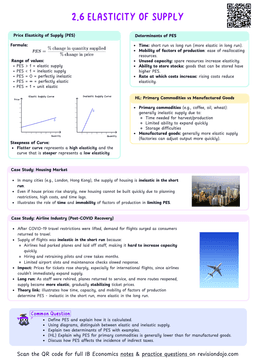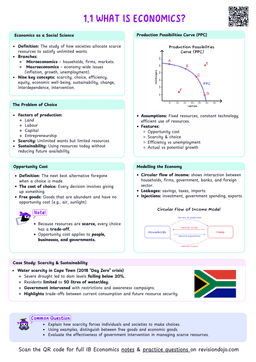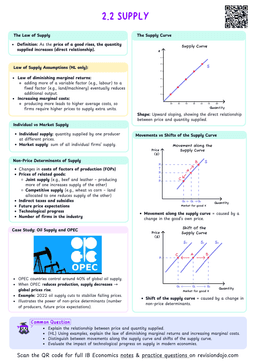Trade Protection
When the government intervenes in international trade by imposing restrictions to reduce free imports.
- Trade protection may offer short-term benefits to some stakeholders while leading to losses for others.
- Regardless, it leads to inefficiencies and negative outcomes in the long run for the economy.
Hence, there are many arguments against trade protection in order to encourage free trade amongst nations.
Arguments Against Trade Restrictions
Misallocation of Resources
- Trade protection leads to an increase in inefficient production from domestic firms, causing a welfare loss as it leads to a waste of scarce resources.
- Therefore, there is a misallocation of resources.
Retaliation
- Trade protection can trigger retaliatory measures from other economies (countries), escalating into a chain reaction of protectionism policies being imposed, leading to trade wars.
- This can harm multiple industries in both economies and reduce overall economic welfare by causing the misallocation of resources to exponentially increase.
Increased Costs
- Trade protection raises the costs of imported raw materials and components, increasing production costs for domestic firms.
- This can lead to offshoring (moving the business to another country) as firms seek cheaper production options abroad.
Higher Prices
- Trade protection measures like tariffs and quotas lead to higher prices for consumers.
- This results in a loss of consumer surplus (explained in 4.2.1 Tariffs and 4.2.2 Quota) and a decline in the standard of living, particularly for low-income households.
Tariffs are often regressive, meaning they disproportionately affect lower-income consumers who spend a larger share of their income on taxed goods.
Less Choice
- Trade protection reduces competition by discouraging foreign firms from entering the market.
- This means the goods that would have been in the market during free trade might not be there when protectionism policies are applied.
- This leaves consumers with fewer options and can lower their overall standard of living.
Quotas on foreign cars may limit consumer choice to domestic brands, which might not offer the same variety or quality.
Domestic Firms Lack Incentive to Become More Efficient
- Protectionism shelters domestic firms from competition, keeping them safe from more efficient and innovative foreign firms.
- This reduces their incentive to innovate (invest in research and development) or improve efficiency since they face no threats or competition.
- This can lead to X-inefficiency (inability to reach full output), where firms operate at higher costs than necessary.
Do not assume that protectionism automatically strengthens domestic industries! In the long run, it can make them less competitive.
Reduced Export Competitiveness
- By shielding domestic firms from competition, trade protection can lead to higher costs and less innovation.
- This makes it harder for these firms to compete in international markets, reducing export revenues.
A protected steel industry may become inefficient and struggle to compete globally, leading to a decline in exports.
Theory of KnowledgeHow do cultural and political differences influence decisions about trade protection? Can one country truly know what is best for another?
Self review- Create a discussion between imposing and restricting policies of trade protection
- Explain the flaws in the arguments of trade protection
US-China Trade War and Tariff Price Wars (2018-2020)
Context:
In 2018, the United States, under President Donald Trump, imposed tariffs on Chinese goods, citing concerns over intellectual property theft and trade imbalances. China retaliated with its own tariffs on US products, sparking a tit-for-tat price war in the form of escalating tariffs.
Effects of the Tariff Price War:
Economic Impact on Both Countries:
- United States: US manufacturers and farmers suffered as China imposed tariffs on key exports like soybeans, pork, and automobiles. Farmers, in particular, lost access to one of their largest markets.
- China: Chinese exporters faced higher costs for goods sold in the US, leading to reduced demand and disrupted supply chains.
Higher Consumer Prices:
- Tariffs increased costs for imported goods in both countries.
- US consumers paid more for Chinese-made electronics and furniture.
- Chinese consumers faced higher prices for American agricultural goods.
Global Trade Disruption:
- The trade war created uncertainty in global markets, affecting businesses worldwide that relied on stable supply chains between the US and China.
Questions:
- How did the US-China tariff price war impact domestic industries in both countries, and were the objectives of the tariffs achieved?
- To what extent do tariff price wars harm global trade and supply chain stability compared to their intended domestic benefits?


